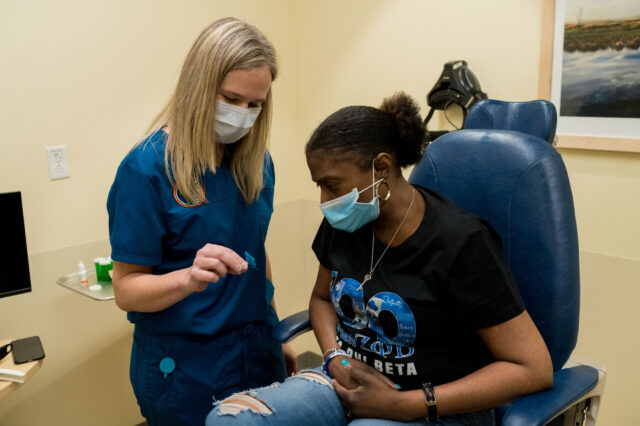Patient safety
Faculty and staff from throughout UF Health regularly engage in interdisciplinary quality-improvement initiatives, reflecting our commitment and ongoing progress in patient-centered, safe practices. We encourage patients to partner with their health care teams and become active participants in their care to achieve the best possible outcomes.
Clinical risk management
Our Clinical Risk Management team identifies risks and improves systems to make patient care as safe as possible. The dedicated team carefully assesses every patient safety report and works with staff to developed procedures that prevent similar events from occurring in the future.
We have an advanced patient safety reporting system that collects and analyzes safety events submitted by clinical care staff. Our clinical risk management team uses this system to help identify underlying factors that cause errors and mitigate future risk to patients through process-improvement efforts. By promoting a culture of safety throughout the organization, our staff are confident that their reported events will be investigated and systems improved to help ensure the safety of our patients.
Your guide to patient safety
While you are a patient at UF Health, we consider you the most important member of the health care team. We work hard to communicate clearly and keep you and your loved ones informed and engaged at every stage of your care. We also want patients to be comfortable and empowered to speak up and ask questions, and to express any concerns at any time. Your input helps us improve your experience at UF Health and helps us provide you with the safest care environment.
Know your care team
- Look for ID badges. Every member of your health care team must wear one.
- Your care team is likely to include physicians, nurses, technicians, pharmacists and support staff.
Know about your care
- You and your doctor should agree on what will happen during your hospitalization.
- Know who will be caring for you — make sure you are given the names of your medical team members.
- Ask about how you should expect to feel after your treatment or procedure.
Help our team identify you
- Wear your patient ID wristband at all times.
- Your health care team must confirm your identity using two forms of ID before performing any procedure, including providing you with medications.
Be informed
- Ask your health care providers whatever questions you have. If you don’t understand the answer, ask again.
- Jot down your questions and comments so you don’t forget.
- Know about your plans for discharge. Your care team should discuss your options with you. If they have not done so, please ask.
Know your surroundings
- Become familiar with your room and nursing unit. Ask about unfamiliar equipment.
- Stay on your nursing unit — it is the safest place for you to be.
- If you need to leave, talk with your physician or nurse first.
Know your medications
- Tell your health care team about every prescription and non-prescription medication or supplement you are taking.
- Tell your provider if you have had an allergic or unusual reaction to any medication.
- Ask for simple explanations about your medications and written information about potential side effects.
- If you think you have received the wrong medication, tell your pharmacist, doctor or nurse.
Speak up
- Voice any questions or concerns about your care to any member of your health care team.
- Tell your health care team if you think they have inaccurate information about you.
- Tell your nurse if you feel that your pain level is not being controlled properly.
- Tell us your wishes about resuscitation and life support — ask your nurse about advance directives such as a living will.
If you need us
- Just ask if you need help getting out of bed. Help prevent fall injuries by following your health care team’s instructions regarding walking or using equipment.
- Dial 61 from your bedside telephone for help if there is a change in your condition that needs immediate attention but has not been addressed.
- Say, “Condition H — I need a Rapid Response Team” and provide your hospital room number.
- For help with cleaning your room, call environmental services any time at (352) 494-4989.
- If you have concerns about your care that have not been addressed, please call for a patient advocate at (352) 265-0123.
Enlist family and friends
- Bring along a trusted family member who can act as your advocate and health care partner.
- Share your wishes about resuscitation and life support with your loved ones or advocate.
- Ask your health care provider to speak up if something doesn’t seem right.
Help prevent infections
- Check with your physician about getting a flu shot.
- Remind your health care team members to clean their hands before and after all contact with you.
- Tell family members who are not feeling well (fever, cold, flu) to please not visit you until they are well.
- Ask all your visitors to wash their hands before entering your room.
Stay tobacco-free
- Please do not smoke or use tobacco products while you are on our campus.
- Ask your physician or nurse for support to help you remain tobacco-free.
Stay active
- Follow your team's instructions to get up and move — it will help you get back to your pre-hospitalization state as soon as possible.
- Turn over often if you have to stay in bed for long periods at a time to help prevent pressure ulcers. Let your nursing team know if you need help.
